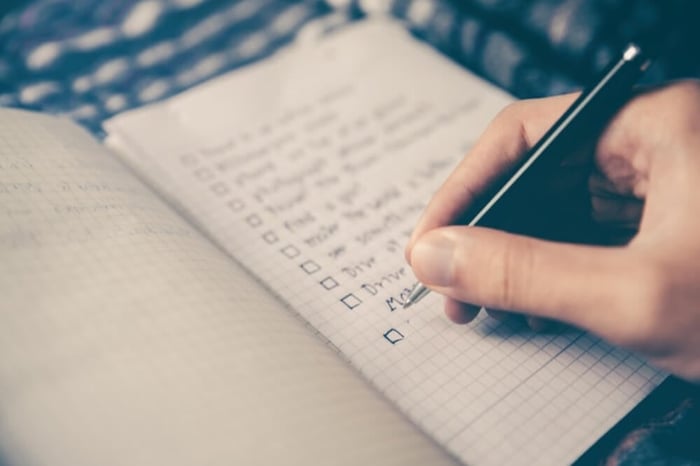Top 5 Personal Statement Mistakes
So you’ve done the work experience, voluntary work & demonstrated your well-rounded skills. Now you’re faced with showing off all your talents, as well as your passion for medicine, in your Medical School Personal Statement. It can be quite daunting but don’t worry because we're going to look at the top 5 mistakes students make so you know what not to do. I know you’re eager to get it all done and dusted so let’s jump right into the five major mistakes that you want to avoid.
1. Editing before writing
A common mistake that applicants make is editing in their head what they consider to be their ‘perfect’ medical school personal statement before even starting to write their actual personal statement. Remember, no personal statement is ever polished on the first draft. It takes dozens of drafts before an ‘adequate’ one is written, let alone the ‘perfect’ one be completed. Don’t edit in your head and discredit your achievements and experiences. Instead, get it all down on paper. That being said, it’s important to reflect on your attributes and their relevance. Read more here on how to reflect in your Personal Statement.
If initially, you don’t want to write it out, grab a dictaphone/recorder and start talking out loud. As previously stated, it’s not supposed to be perfect on your first draft, all the editing and organising can be done later. Doing this means that you won’t overlook small parts of your experiences that may actually be quite significant. Once you’ve done this then you can start to analyse what you’ve written down and think about what it brings to your personal statement. In the words of Peter de Vries “Write drunk, edit sober”. Although I wouldn’t recommend actually getting drunk while writing your personal statement.
2. Listing your experiences
This mistake is often made by applicants who have plenty of work experiences and, in order to fill the 4,000 character count, end up just listing all of their experiences instead of exploring them and going into detail. It’s important that for every work experience you mention to make sure that you’ve talked about a specific incident and what you learnt from that. If you’ve already made a few drafts, take a step back and read through it. Find where you’ve mentioned a work experience and, if you haven't explored it and reflected on what you gained from it, then you may be guilty of listing your experiences.
The whole point of the work experiences that you undertake is to show the admissions tutor why you did it, what you actually saw while there, what you gained from it on reflection and importantly, why it makes you the ideal applicant to study medicine. It’s better to include half of your experiences and to actually reflect on them in detail than having 100% of them in a list which doesn’t add anything to your personal statement.
3. Irrelevant points
Remember the point of the personal statement. You only have 4,000 characters to sell yourself so it’s extremely important that every sentence is relevant. Your personal statement should address why you want to spend the next 5/6 years of your life studying medicine and the rest of your life practicing it. It’s vital that you outline what makes you an ideal applicant and to also show what you have an understanding of what a career in medicine entails. Many applicants think that having gone through a traumatic experience demonstrates this, however it does not.
Reflect on the relevant experiences you’ve had, be it the mundane or the extraordinary, and describe what got you interested in medicine and explain why it keeps you interested in medicine – it is far more valuable. A good way to ensure the relevancy of your points is to read through your personal statement and for every sentence, ask yourself “Does this show my passion for medicine?” or “Does this demonstrate what makes me an ideal applicant?” If it doesn’t, then you’ll want to reconsider including it in your final statement.
4. Overusing keywords
Another error that applicants tend to make is using a lot of keywords. (you know, teamwork, empathy, leadership, etc.) More often than not, overusing keywords can end up sounding very superficial, especially if you don’t back it up. This isn’t to say that you shouldn’t use them! They’re very important but it looks a lot better if you can mention the buzzword to show that you’re aware of the skills of a good doctor, and then go on to back it up with a personal experience to truly make it interesting and personal to you.
The other extreme is refraining to include keywords at all. It’s important to find the right balance so it’s not obvious that you’re throwing in all the skills you can think off just to tick the boxes. A good place to find examples of these keywords is in the General Medical Council’s “Tomorrow’s Doctors” document which outlines all the skills that are essential to being a good doctor and the ones you’ll develop. Read through it and try to think of instances where you’ve demonstrated these skills.
5. Not proofreading
The final mistake is proofreading. Or lack thereof. It’s indeed very obvious to proofread your personal statement but it’s actually surprising how many people forget to do just that. The process of writing the ‘perfect’ personal statement is difficult and involves countless hours of writing, editing only to rewrite and re-edit so it’s understandable that in the midst of the mayhem that is applying for medicine, you just want to get it over and done with and send it off. But don’t worry! Although this is one of the easiest mistakes to make, it also one of the easiest to avoid. Once you’ve finished each draft, just take a few minutes to read through it top to bottom.
An extremely useful way of finding grammatical errors is to read your personal statement out loud. You can read it to yourself, to your neighbour, to your parents, to your dog, to your neighbour’s parent’s dog if you really want to – jokes aside, just be sure to proofread it. Record yourself reading out loud or read it in front of a mirror. Mistakes are more evident once you scrutinise your work in different ways. Asking a friend or family member to read through your personal statement, even if they’re from a non-medical background, is also beneficial as they’ll be able to spot any glaring errors that you might have missed.
So, after reading the above, I hope you feel a little more enthusiastic about writing your personal statement now that you know what to do. If you would still like more support your can contact an MSAG Guide today or visit our website and see how we can help. Good luck with your application and remember it’s all going tibia okay.




